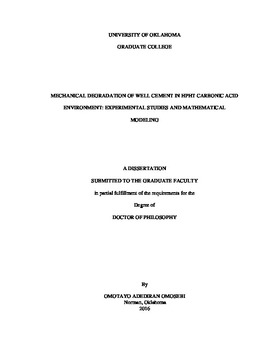| dc.description.abstract | Cement exposed to brine saturated with CO2 gas undergoes combination of chemical processes leading to mechanical degradation after placement behind the casing. These processes are influenced by downhole conditions such as temperature, pressure, and the composition of CO2 gas. The objectives of this study are to understand the mechanisms governing the degradation of well cement and to quantify the rate of deterioration using experimental and modeling techniques.
Experiments were conducted by exposing Classes G and H cement to CO2-saturated brine solution under HPHT conditions. Temperature was varied between 100°F and 430°F while pressure was varied between 3,000 psi and 9,000 psi. To generate aggressive fluid around the cement, the composition of CO2 gas was varied by injecting a mixture of gases, containing varying compositions of carbon dioxide and methane, into the HPHT autoclave. Compressive strength was measured before and after exposure to determine the alteration in mechanical integrity due to chemical attack. In addition, fluid samples were collected after the test and chemical analysis was conducted to quantify pH and calcium content. These are supported with porosity, permeability, FTIR, XRD, EDX, SEM, and visual inspection of the degraded specimens. Besides, a methodology for coupling the governing mechanisms involved in cement degradation is proposed and a fully-coupled model is developed.
In both classes of cement, overall mechanical behavior shows improvement, although the specimens were chemically degraded. Three mechanisms of degradation were identified as the driver of the degradation process. Structural transformation of calcium silicates at elevated temperature leads to slight retrogression in strength. Carbonation reaction improves mechanical strength but reduces porosity and permeability. Bicarbonation and leaching reactions increase porosity and permeability leading to the loss of mechanical strength. These mechanisms are interrelated; the overriding process governs the rate of degradation. Within the experimental time scale adopted in this study, carbonation is the rate-controlling process because overall mechanical integrity is improved. Parametric studies of the effects of downhole parameter on mechanical behavior show that cement degradation is sensitive to temperature, pressure, and CO2 gas composition. Relative to CO2 gas composition and pressure, temperature is identified as the most critical downhole parameter for cement design in HPHT carbonic acid environment. Comparison between experimental data and the model developed in this study shows good agreement.
Very limited studies have been conducted to evaluate cement performance in HPHT acidic environment. In previous investigations, alterations in the mechanical strength of well cement in hostile environments have not been thoroughly examined. This study provides understanding on how the mechanical integrity of commonly used well cement is affected by aggressive and harsh downhole conditions. The outcome of this study lays the ground work for engineering CO2-resistant cement that would ensure well integrity for long-term CO2 storage and containment. | en_US |
